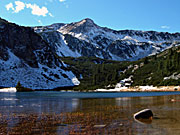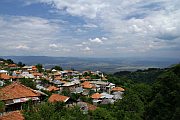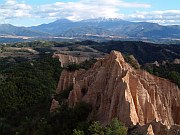This website is an archive from 2016
This site was actively maintained from 2006 to 2016. Since then I have kept it online for historical interest, but have made no further updates. Much of the information in these pages is now incorrect or obsolete.
The Pirin Mountains
Bulgaria's south-west corner holds some of its most exciting landscapes, ranging from towering granite peaks to otherwordly sandstone pyramids. As well as offering access to all this scenery, Bansko and Melnik are attractive places to stay in their own right.

Bansko and Mt Vihren

Lake in the Pirin Mountains
Bansko
Located at the meeting point of the Pirin, Rila, and Rhodope mountains, with good transport connections and convenient access to hiking trails in the Pirin, Bansko is a popular stop on journeys around southwestern Bulgaria. It has an attractive old centre, with plenty of stone houses and cobbled lanes. Bansko is also known for its many traditional restaurants or mehanas, where you can fill up with hearty mountain fare to replace the calories you burned off while hiking. Folk bands often play in the mehanas - out of season the band members can outnumber the diners.
It's possible to start hiking at the southern edge of Bansko, at the entrance to the National Park. The trail to the Demyanitsa hut, for example, passes a couple of waterfalls. It does take a long time to get above the treeline, so you might want to arrange transport to one of the hikers' huts. There are plenty of marked trails and a number of mountain refuges for multi-day trekkers. Even if you only have a day to spare, you should be able to make your way through some wonderful glacial landscapes dotted with lakes. Other trails start from the nearby logging town of Dobrinishte.
When I first visited Bansko it had a modest tourist trade, mostly appealing to Bulgarians. Over the last couple of years it has been developed as a large international ski resort. A new cable car has been opened, characterless hotel and apartment buildings have spread across the plateau at an astonishing rate, and dozens of estate agents advertising in English only have appeared in the centre of town. No doubt this is good news for skiers, but unfortunately it somewhat detracts from the town's appeal for summer visitors. During a later visit in July 2006 I had to abandon an attempt at an evening stroll on the edge of town, due to the incessant construction traffic which had made the streets even muddier and dustier than in a normal Balkan town. Perhaps things will improve when (if?) the building work is completed.


Delchevo
Gotse Delchev
Follow the Metsa valley south from Bansko to reach Gotse (or Goce) Delchev, located where the valley broadens out just before the Greek border. The town isn't a major destination in itself but does have an appealing Mediterranean feel, with life appearing to be lived mainly out of doors (at least in summer), and the central streets brightened by a profusion of flowers.
One reason people come to Gotse Delchev is to visit a number of nearby highland villages. Delchevo is only a short distance to the west, in the forested Pirin foothills, but feels thoroughly remote. Delchevo is not to be confused with either Gotse Delchev or the town of Delchevo just across the border in Macedonia (all three were named after the same revolutionary hero). It is a cluster of stone houses huddled at the top of a steep valley. A footpath (probably a mule trail) from Gotse cuts straight up the valley, whereas the road is forced into a convoluted detour to gain the required height. The village itself is literally the end of the road, although a marked path leads further west into the mountains. Delchevo reminded me of some of the villages in Greece's Pelion Peninsula - but instead of sea views there are panoramas of the Mesta Valley, and the Rhodope Mountains on the other side.
If you have more time than I had, you might also be interested in a number of historic villages to the east of Gotse Delchev: Dolen, Leshten, and Kovachevitsa.

Between Melnik and Rozhen

Rozhen Monastery
Melnik
Melnik is situated in the Southern Pirin, near the Greek border. It's a tranquil village of whitewashed stone houses, some adorned with vines - Melnik's wine is said to be the best in Bulgaria. Melnik was once home to an astonishing 20,000 people, compared to a few hundred today, and there are many ruined churches and houses scattered around the outskirts. This part of the Pirin looks completely different from the area around Bansko - Melnik is surrounded by sandstone that has been eroded to form pyramids and pinnacles. If you have visited Cappadocia in Turkey, the landscape here may seem slightly familiar - indeed Melnik reminded me strongly of Göreme, right down to the dry creek running through the centre of the village.
Rozhen Monastery is just a few kilometres from Melnik. It is plainer than Rila or Bachkovo but worth a visit if you are in the area. There is an intermittently marked path between Melnik and the monastery - follow the valley from the northwest of the town. The path leads over a ridge with wonderful views of sandstone ridges, the Pirin to the north, the mountains of Greece to the south, and the monastery itself just below. When I visited in late 2003, the last section of path leading downill to the monastery had been partly eroded and was quite difficult to negotiate. It's also possible to walk along the road - there is hardly any traffic.
Practicalities
Bansko is well served by buses from Sofia (3-4 hours). Most of them leave from Sofia's Ovcha Kupel bus station, but there are others from the Zapad station and a couple from the more convenient Central Station. Most of these buses pass through Blagoevgrad which is a useful transport hub. There are also a couple of buses from Plovdiv. However, the most interesting way to arrive or depart is on the narrow-gauge railway to Septemvri.
Gotse Delchev is also quite easy to get to provided you are coming from the north. Regular buses making the one-hour journey from Bansko via Dobrinishte; many of these originate in Sofia (about 15 daily). There are also a couple of daily connections to Plovdiv, one bus to Petrich on the western side of the Pirin, and possibly even a few services weekly to Drama in Greece. I'm not sure if there are buses to Delchevo, but a taxi shouldn't be too expensive. Alternatively, walk along the road for Delchevo and look for a trail marked with blue and white blazes. After a while the trail leaves the road and takes a more direct (and steeper) route to the village along the side of a gorge.
Getting to Melnik requires more careful planning. There is only one daily bus from Sofia (4 hours), and a couple from Sandanski (30 minutes). A few buses make the short trip to Rozhen Monastery. Melnik has plenty of accommodation but few other facilities such as ATMs.
More photos of the Pirin region in my Bulgaria Galleries